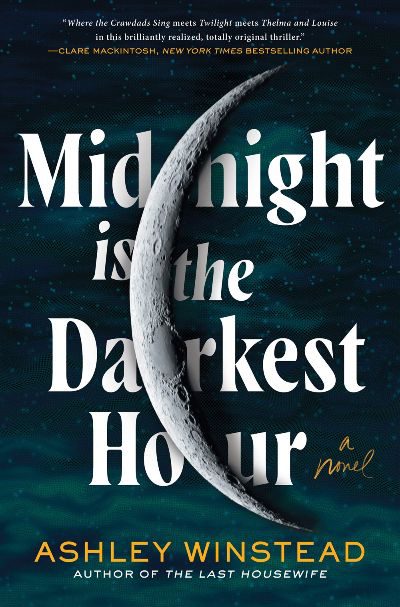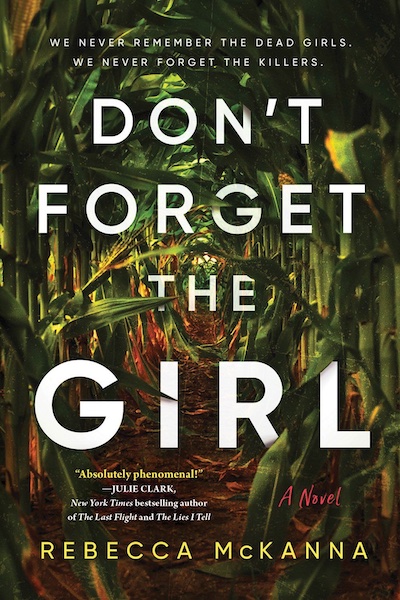Elizabeth is in a rut. Her job isn’t so satisfying, and her marriage is on the rocks. Her every move seems to trigger a report by her husband, David, to their therapist. She feels ganged up on and adrift, which is bad enough. That descends into depression, which others believe is paranoia, when she finds her neighbor Patricia dead. Others say it’s suicide, but Elizabeth is sure it was murder and is determined to find the culprit. She has a willing sidekick in her sleuthing in Brianna, the assistant that David insists his wife take on to help out at home. Brianna, who is Black, is all too willing to be white Elizabeth’s new best friend, Watson to her Sherlock, and de facto therapist, given that Brianna has a strong motivation to insert herself into her employers’ upscale Memphis neighborhood: someone there called the cops on her son and they killed him. As the plot twists and turns, deceptions build, and though readers have the benefit of a birds’ eye view of the story, surprises are in store. This is reminiscent of Elizabeth Day’s Magpie, with its suburban setting and overcrowded marriage; the effects of gentrification and racism also loom large. For fans of Magpie Murders and novels that pack in the psychological drama.
Women
Ruth Cornier is that rarity in fiction: a woman who had the chance to get out of the town that’s too small for her—in this case, Bottom Springs, Louisiana—but stayed. Growing up, everyone knew her as the preacher’s daughter, and nothing’s changed, except that she’s no longer under her father’s thumb. She is still, however, the subject of her downtrodden mother’s malice-filled plans to drag her back to the snake-handling church’s fold. What’s so objectionable about Ruth? It’s her firm friendship with Everett Duncan, her Heathcliff-reminiscent best friend, who’s returned to town after Ruth thought him gone for good. While Ever is the kind-hearted son of the mean town drunk, locals think he’s an apple from a no-good tree, and even suspect him of being the Low Man, a supernatural being who drags people into the swamp. When a skull is found in that same swamp, Ruth and Ever are thrown back into dark days of their youth while also desperately trying to find what really happened before Ever gets what locals think he deserves. As in Winstead’s In My Dreams I Hold a Knife, sharp writing, compelling dual timelines, and sympathetic characters will keep readers turning the pages.
Ryan Summer helps a young woman named Evie Porter with a flat tire, and shortly afterward, they are inseparable in Elston’s twisty thriller. He falls head over heels for her, but in Evie’s case, the relationship is an assignment from her mysterious boss she has never seen, Mr. Smith. Her orders are to get close and obtain information about Ryan’s business. As time passes, she finds herself falling for her mark, and one evening, while meeting some of Ryan’s friends, she meets Lucca Marino. Evie’s real name is Lucca Marino, and this woman is using Evie’s real-life identity and background. It’s clear her boss has put a target on her back, and she will have to use all her manipulative skills to stay alive, even if that means she has no realistic chance of returning to her old life. Retirement is not an option. Elston has crafted a story that stretches credulity a bit, but works. Readers will be dying to finish this fast enough so they can decipher what’s going on, and it’s a guarantee that they’ll find the truth unexpected. Fans of Hank Phillippi Ryan and Megan Miranda should seek this out.
“Kill someone and she becomes part of you…Take her life and where do you put it?” Trying to rid yourself of your victim’s voice is “A rubber band you can never snap.” The women doing time in an Arizona prison in Pochoda’s latest, including our downtrodden hero, Florida, are firmly stuck, mentally and physically. Until COVID hits and some are released to allow for social distancing. Florida was due for release soon anyway, and the early liberty doesn’t seem much like a gift when she’s stuck in Arizona with no way to get home to Los Angeles. Life’s been cruel to Florida (real name: Florence, but prison nicknames stick), and the first setback—the Department of Corrections forgetting to feed her when she’s enduring quarantine in a dead-end motel—sets her on the road, fleeing parole restrictions. On the bus to freedom, she runs into her nemesis Dios, another former inmate, and the Orange is the New Black comparisons start to stack up, with former rich-kid Florida taking Piper’s role and Dios Red’s. But this transporting tale is much more a coming-of-age saga than an OITNB spinoff. With Officer Lobos—Florida’s doppelganger in haplessness and hard luck—on her tail, can Florida outgrow her prison persona and find freedom?
Liv is imprisoned in a rusting shipping container in rural Alaska, her captor her ex-husband, whom she’s tracked down after he faked his death and ran from their marriage and disabled son. He’s now living with a new partner in a proto-cult based on the writings of a guru who espouses pleasure above all else and is happy to philosophize endlessly while harsh conditions threaten his family. Over time, as Liv gains entry to Mark’s house and to some of his more sordid secrets, she plots her escape, one that it seems impossible being phone- and car-less as she is. Townsend takes us on a tense ride through family and cult dynamics, along the way treating us to a memorable look at female and parental resilience; the up-close look at a narcissistic patriarch who’s setting himself up to fail is a bonus. For fans of wilderness thrillers such as Karen Dionne’s The Marsh King’s Daughter.
A near-perfect novel of utopia-gone-wrong. Liz and her three female friends take a vacation together every year, typically somewhere with plenty of sun and a good bartender. But this year it’s Liz’s turn to pick, and needing a radical reset, she decides they’ll go mountain climbing in the gorgeous wilds of Norway. Gorgeous, but deadly. And—as the locals point out, not a climb for the inexperienced—which is all of them. Here’s a bit of what could go wrong: creepy, predatory males spying on them; killer storms; mud slides; loss of all provisions; no cell phone reception; and interference from a drug cartel. In addition, each woman manages to screw things up in her own way, like losing the trail or spraining an ankle, regularly setting them at one another’s throats. The novel builds slowly, we get plenty of insight into each woman’s personal life and the baggage she hopes to leave on the mountain, while the suspense blossoms beautifully. Richly atmospheric, well-plotted, with plenty of insight into female friendship, this should appeal to fans of Lisa Unger and Claire Douglas.
Brilliant writing. Clever plotting. And a work of speculative fiction, set in a near-future world, that is totally fascinating. Lou is the fifth victim of a serial killer, leaving behind a lovely toddler and bereft husband. Until she—along with the other four victims—is brought back to life through a government program, the “replication committee,” that clones victims. Celebrities and women advocates, who took to the streets with a red gash painted across their necks—mimicking how the victims were murdered—drew attention to their plight. But understandably, adjustment to her old/new life isn’t easy, although a support group with the other women helps. Then Lou learns some things about her murder that raise some serious questions, making her wonder whom, if anyone, she can trust. Much of the beauty of this book lies in the details; Lou works as a touch therapist in a franchise in a strip mall, dispensing hugs to the emotionally needy. These sorts of facts build on each other slowly, creating a fascinating world, when all of a sudden the book takes several sharp turns that will leave the reader gasping. Addictive, fast, and smart.
First, there were three. Now only two women are left, estranged but still desperate to know what happened to their college friend Abby, who disappeared years ago. They might never know, as serial killer Jon Allan Blue, who killed other young women in the area around the same time, is about to be put to death. The two remaining friends can’t be more different. Bree is a college professor who’s having an affair with an underage student, which sets in relief the unending turmoil caused by Abby’s death. Chelsea is an Episcopal priest whose collar and steadfast demeanor hide an inner longing to break out of her marriage to a man who “looks like a photo of himself that [has] been left too long in the sun.” The two must interact again when a true-crime podcast covers Blue’s killings. The producer tries to convince Bree and Chelsea that their friend’s case deserves to be investigated, but with the show breathlessly feeding the media frenzy with comments like, “Friends don’t let friends get murdered” and Blue himself relishing the spotlight, participation seems counterproductive, not to mention tacky. While Abby’s fate is debated, we flash back to the three friend’s lives in the run up to her disappearance. This and the carefully posed exposé of podcast politics will leave readers looking differently at the spectacle that is the true-crime world, especially when it comes to women victims.
An unnamed village in Cork, Ireland, is a social-media-fueled soap opera in Bose’s suspenseful debut. Ciara lives for her own camera, with her rich husband and three perfectly-dressed-at-all-times children supporting actors in an Instagram fiction. The mostly fawning comments from the neighbors include some from her Indian neighbor, Mishti, who left love in India for an arranged marriage to cold, miserly Parth. Her only joy is her daughter, Maya. Decidedly not fawning is neighbor Lauren, who inherited her home in the wealthy enclave that Ciara rules. Lauren doesn’t fit in and doesn’t care to. She carries a child in a sling almost constantly, while Ciara’s Instagram-approved parenting involves virtually no contact. Lauren’s house is dirty, her clothes are too, and her husband is the furthest man from Parth imaginable. The women’s sniping relationships with each other and their families build to a boiling point, one whose violent outcome is revealed near the beginning of the story in a scene that lingers mysteriously in the background as the drama festers. Mishti’s struggles are a highlight here, sad though they are, with Bose’s writing of a desperate character sadly reminiscent of Parini Shroff’s The Bandit Queen.
It’s Tuesday afternoon in suburban Stanhope, and all is as it should be. Family man Dr. William Wooler is at a local motel with one of the hospital volunteers. Except it turns out that today she’s decided to dump him. Furious, he heads home, only to discover his nine-year-old daughter, Avery, in the kitchen, having skipped out on choir practice. As “difficult” as she is mouthy, she’s sucking down Oreos and doing a good job of pressing her father’s buttons. But when Wooler strikes her with a blow to the head that knocks her to the floor, it’s still a shock, to both of them and the reader. Dad-of-the-year hightails it out of there—he goes for a drive to cool off—and when the Woolers’ son gets home from basketball practice, he finds the house empty. Where’s Avery? Thus begins this intense domestic suspense novel in which an entire community is taken apart and turned inside out. Families are interviewed, oftentimes iteratively, histories are resurrected, houses are searched, motives are examined, and what the cops don’t expose, the media does. All the pieces come together brilliantly in a shocking finale.










